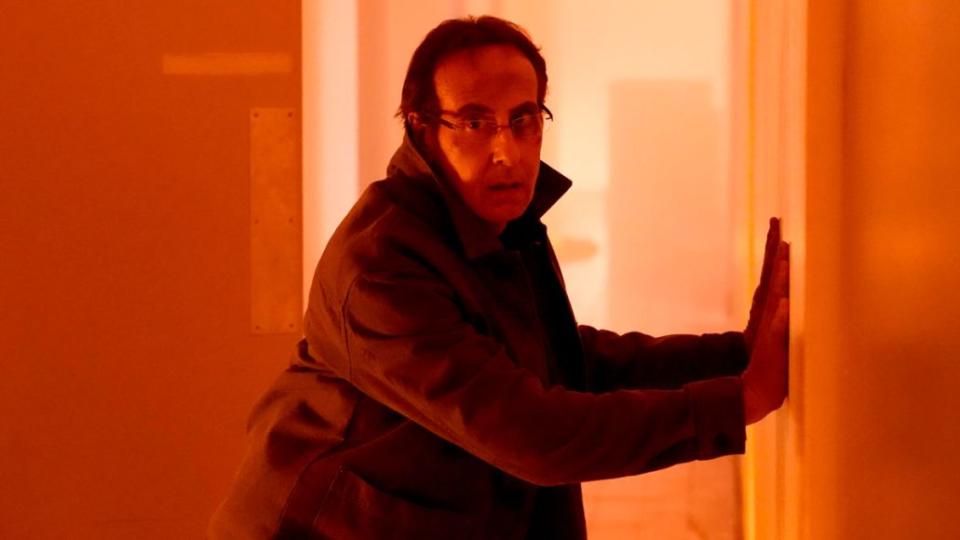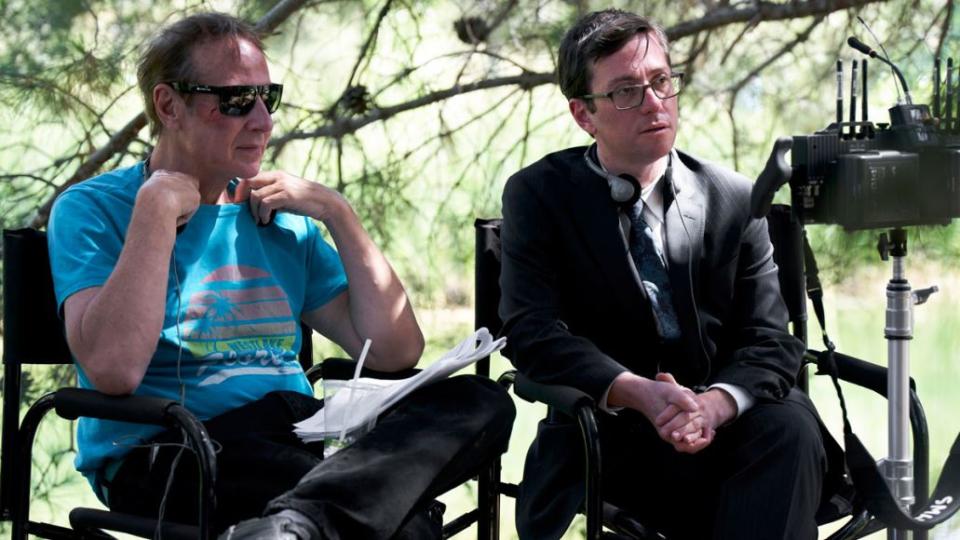Paul T. Goldman’s Creator on the Show’s 10-Year Journey: “I Let Reality Steer This Whole Thing”
- Oops!Something went wrong.Please try again later.
The post Paul T. Goldman’s Creator on the Show’s 10-Year Journey: “I Let Reality Steer This Whole Thing” appeared first on Consequence.
The first time Consequence speaks with Jason Woliner about Paul T. Goldman, he’s not entirely sure how his Peacock show will end — because the Nathan for You and Borat Subsequent Moviefilm director hasn’t finished filming it yet. It’s two days before the show’s official red carpet premiere in December 2022, and those attending have been informed that cameras will be present at the theater, to capture… well, Woliner isn’t sure at the time what will happen, after the titular Paul T. Goldman finally sees the TV show Woliner’s been making about him.
As the hybrid scripted-unscripted comedy itself documents, Paul T. Goldman came about after Goldman, a middle-aged man totally outside the world of Hollywood, began sending messages to seemingly every director on Twitter, asking them to consider making the film adaptation of a book he’d written about his life.
“I got a few responses from some independent directors who said, ‘If you have a million dollars, I’ll direct your movie,'” Goldman said to the crowd during the post-premiere Q&A. However, Woliner was the only one who read the book and became fascinated with Goldman’s perspective on the world.
“I absolutely became obsessed with the book and felt like Paul was the most interesting thing about it,” he says to Consequence. “I mostly became fixated on him, and the idea that you could do, ultimately, a documentary project — because it is a profile of a real person.”
Woliner’s initial introduction to Goldman and their subsequent first encounters took place in 2012, and over the following decade, Woliner went down the rabbit hole with Goldman, investigating the story Goldman tells in his self-published Amazon book Duplicity: A True Story of Crime and Deceit while also filming scenes from the book (written by Goldman for the screen, featuring guest stars like Frank Grillo, Rosanna Arquette, W. Earl Brown, Melinda McGraw, and Dennis Haysbert). Woliner even shot a pilot in 2017 for Hulu that didn’t get picked up, but did give him something to show potential partners after taking an extended break to focus on Borat.
For, when the Borat sequel became an international hit in 2020, it created a “blank check” moment for the director, and “the first thing I wanted to do, after I finished that, was finish this project. And because [Borat] was an ambitious project on paper that could have gone very badly, could have not worked, I think that helped people take the leap of faith at Peacock… that maybe this wouldn’t be a complete disaster,” he laughs.

Paul T. Goldman (Peacock)
Goldman’s book, the initial source material for Paul T. Goldman, recounts how, as a divorced father, he found himself in a relationship with a woman known initially as Audrey, whose “part-time” approach to their marriage and increased demands for money eventually revealed her to be taking advantage of him. In Goldman’s version of events, as seen on screen, the hapless Paul discovers that Audrey is actually the ringleader of a gang of “hookers” (Goldman’s word) working for Audrey and Audrey’s pimp.
However, as the show reveals, Goldman’s version isn’t accurate, and the series is at its darkest when it pushes back on Goldman’s version of events, and even his own attitudes towards women: In Episode 5, for example, someone points out to Goldman that the Russian mail-order bride industry, through which Goldman met his first wife, is very similar to sex trafficking. “And I’m glad she did that,” Woliner says, “because I thought it was so interesting that he didn’t even understand the question. So obviously this perspective that he has has a lot of misogyny baked into it. ”
Woliner adds, however, that “to try to explore that without judgment was my goal — to actually get into what made someone like this and try to figure it out and try to determine where he is coming from. This is someone, if you read about him, you would say, ‘This is a guy who hates women’ — reading the book, it’s very, very dark at points, shockingly so. And then meeting him, he’s so light and likable, everyone on set liked him, all the women really got along with him. He’s so lovely to me.”
Woliner pauses. “I don’t want to be mean to Paul, but… I won’t say cluelessness, but I don’t think he understands certain things. And I think some of it is how he was raised and some of it is how he’s wired. But it was an interesting exercise in engaging with someone who has very outdated views on this kind of stuff, and try to understand where they come from, and what motivates them.”
“So I was really fascinated by that. The story seems like it’s written by a really angry guy who’s mad at women for not being his idea of how they should behave, and has these very outdated perspectives. All that is entirely true. At the same time, he’s a human being. And I do think, you know, spend enough time with anyone, you can have empathy for them.”
Woliner knows that people might disagree with him there. “I have so many female friends who have watched these episodes and just despise Paul,” he says. “And I knew that was going to be a response. But we spend so much time with him and in his head in the show, it’s hard not to arrive at a complex opinion of him, which was my hope.”
To him, “Everything is so black and white these days, and we have our people who are on our side and we have people who are enemies and we’re all very dug in. It’s very hard to maintain any kind of nuance or complexity about how you think of people in today’s climate. And part of this was an attempt to see, ‘Can you go beyond your initial reaction to someone with these views, and try to understand a person like this?’ Because I do… I like him. At the end of the day, you can’t know someone for 10 years without liking someone.
“But also,” Woliner adds, “I liked everyone on Borat, and I was shooting with people who have completely different views than me. I lived in that house with those two conspiracy guys, Jim and Jerry, for the week that we lived there. And I really liked those guys, and we could not be more different. So I do think there is something to, you spend enough time with a person, you may not walk away thinking any of their views are valid or justified, but once you see someone as a human being, it’s hard not to have some empathy for them.”
One element of the series that Woliner initially resisted was his own involvement as a character. “I really didn’t want to be in it. I did not want to be on camera,” he repeats to Consequence multiple times, in both of our interviews. Specifically, he says, “I didn’t want to be like Andrew Jarecki in The Jinx — I felt like that was so much about him and his ego, and it was so repellent to me that I was just like, ‘I don’t want to be in this.'”
However, he says, “Obviously, you have to acknowledge the presence of a filmmaker who is doing this — to not do that would be dishonest. I was always going to be part of it in that way. And what happens in the show was true: Paul started writing scenes with dialogue for me.”
Those scenes included “a speech about how amazing he was” and “a few pages about the rise and fall of Quibi,” but ultimately Woliner had to concede that “because it took a decade and the show was about, in large part, the making of itself, I had to be some part of this story. But I really did resist it in a way that’s accurate to what’s on screen. I try my best to not be in it, but at the same time I was trying to let him steer the process. So at a certain point I had to agree to be in it.”
Which led to the sequence in Episode 6 where we see Goldman watch the show at the premiere for the first time, surrounded by a laughing crowd. “I had never seen a project like this about a real person that included the real person’s reaction to seeing the project,” Woliner says. “That’s kind of impossible, usually, to do. But I convinced Peacock early on to not drop all the episodes at once. I was like, ‘Let’s release one to two or three at first and then give us a few weeks so we can finish, so we can actually include the response to this show in the last episode.'”

Paul T. Goldman (Peacock)
The show’s official premiere was held at the Laemmle Fine Arts Theatre in Beverly Hills, with attendees including executive producer Seth Rogen and Woliner’s old Nathan for You boss Nathan Fielder (wearing an outfit eerily close to his wardrobe from The Rehearsal). And as depicted in Episode 6, Goldman was also there in his burgundy tuxedo, the camera watching him watch the first three episodes.
Afterward, Woliner didn’t know how Goldman would react — “that morning I was like, what if Paul punches me in the face?” — but he knew he wanted it on camera. “So I told the cameras, after the show, after the lights come up and before the Q&A, I’m going to pull Paul behind this curtain and we’re just going to talk for a few minutes. So try to get us there,” he says. “But I wasn’t like, stand here, we’re gonna do a scene. I was just like, ‘Okay, come over here. What did you think? Are you mad at me?'”
The ensuing conversation, as captured for the episode, was, Woliner says, “everything you see right there. We just made a few cuts for time, but that is the conversation. I didn’t know what he would say, and he couldn’t have said a more dignified and perfect thing, I thought.”
Adds Woliner, “I am still trying to figure out exactly why I got so emotional in that moment. It’s so horrifying to me, the idea that I would be emotional on camera, and I also didn’t see that shot, so I wouldn’t have had the [cameraman] go that close on me. It’s jarring, and it’s really raw. I look like I’m about to cry, because I felt like this was probably the last time that two of us were going to do something like this, and we’ve been doing it for 10 years.
“After all this time and after seeing the show, he’s still giving me better than I could have ever hoped. It’s this weird kind of magic when we just turn a camera on Paul and it’s like, oh, this is maybe the last time I’m going to feel like this. And then maybe it was because yeah, he’s okay with it now, but I don’t know what the future holds for us. There was just a lot going on in that moment.”
At the end of our first interview, before he’s completed Episode 6 (and before he’s had his final on-camera conversation with Goldman) Woliner says that “I just kind of let reality steer this whole thing. This project has told me time and time again what it wants to be, so it may be over or it may not be. I have no idea.”

Paul T. Goldman (Peacock)
In January, with Episode 6 complete, it does seem like Woliner is finished telling his story — though, he says, “I have no idea what the future holds with, with this or with Paul. I know he’s raring to go with The Paul Goldman Chronicles.”
That’s a reference to one of the many additional potential projects Goldman has created as spinoffs from his original saga — which proved to be integral to how Paul T. Goldman ends. “I never knew how this thing was gonna end,” Woliner says. “One idea along the way was that the show gets crazier and crazier and it winds up being about these spinoffs and sequels, and we wind up seeing what they’re doing for him: He’s using this bad situation from his life, that you can debate whether or not he deserved, to create a fantasy world where he gets the life he wants, where he can be a hero, where he can have the family he always wishes he had, where he can be vindicated and he can be right.”
So, Woliner thought then, “maybe this just ends with Paul is famous now. He is famous, he’s a meme, and isn’t that the American dream?” As part of that, the viewer themselves would be forced “to think about their own complicity in it. If you’ve told your friends, if you’ve tweeted about it, whether you love him or hate him, we’ve all helped make this guy famous now. And that’s a pretty cynical ending,” he laughs.
Then, a few months ago, as Woliner and Goldman were in Florida filming a few final pieces of the series, Woliner “had this moment where I just asked him, like, ‘Why are you doing all of this?’ It wasn’t planned. I never asked him that flat out before, but it just struck me. And he thought about it for a sec — you see it in the show — and then he suddenly launches into this incredible inspiring movie-ending speech, almost exactly how it’s presented.”
Goldman’s speech, Woliner says, “somehow took almost the exact same thing I’ve been thinking about, but framed it in the least cynical way possible, which is that ‘I stumbled onto this thing that gave my life purpose’ and made it about empowering himself through creativity. And then willing it to the point that it became a real thing in the real world. Now tons of people know about this and will have opinions on it, but ultimately it’s like, ‘Oh, this is how he became someone.'”
And, like him or hate him, if you’ve read this far you definitely know Paul T. Goldman’s name. Footage from the post-premiere Q&A didn’t make it into Paul T. Goldman the series, but Goldman also got the last word there, as the moderator asked him what his advice would be to aspiring storytellers — “because you did it.”
“Three words,” Goldman said then. “Never give up.”
Paul T. Goldman is streaming now on Peacock.
Paul T. Goldman’s Creator on the Show’s 10-Year Journey: “I Let Reality Steer This Whole Thing”
Liz Shannon Miller
Popular Posts
Tim Allen Flashes Home Improvement Co-Star Patricia Richardson in Resurfaced Clip
20 Albums for When the Crushing Melancholy of Life Drags You Under
Jeremy Renner, a Real-Life Superhero, Was Trying to Save His Nephew When Crushed by Snow Plow
Adam Scott Confronts Boy Meets World Cast About "Traumatic Experience" of Hug Snub
Pantera Removed From German Festivals Following Backlash [Updated]

